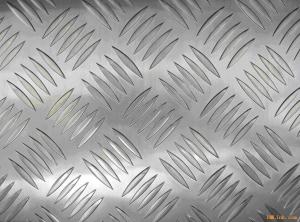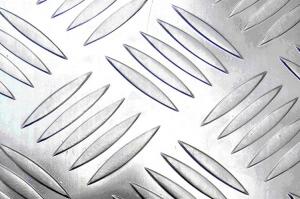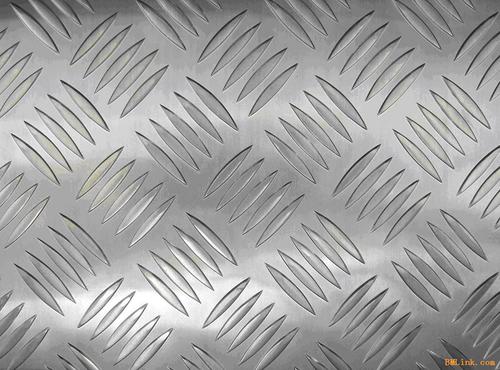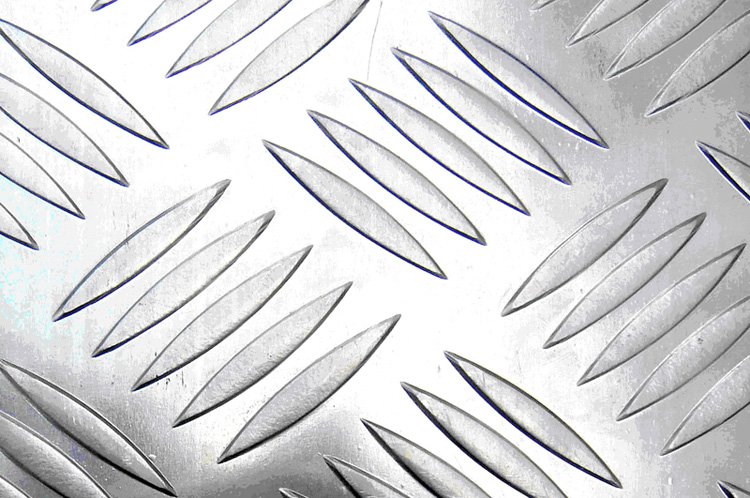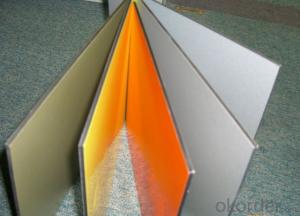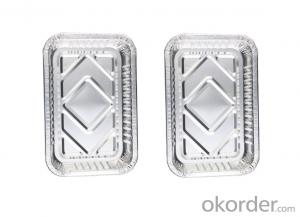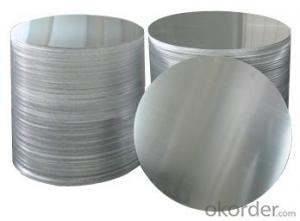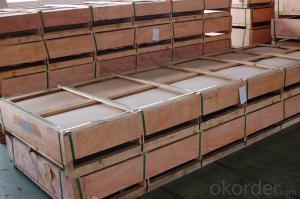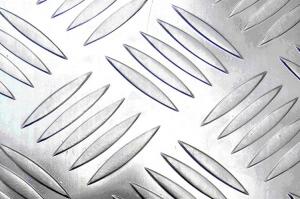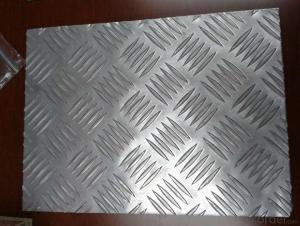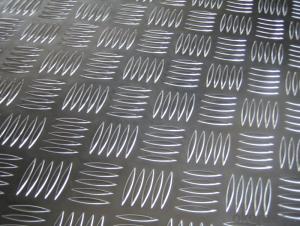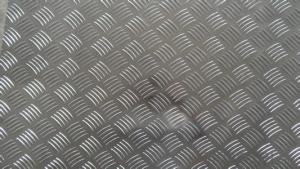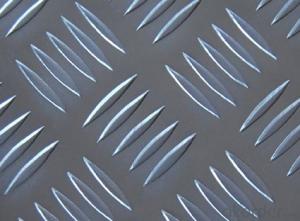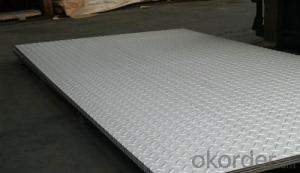Expanded Aluminum Sheets - Small Five Bar Aluminum Sheet
- Loading Port:
- China Main Port
- Payment Terms:
- TT OR LC
- Min Order Qty:
- -
- Supply Capability:
- -
OKorder Service Pledge
OKorder Financial Service
You Might Also Like
Product Information:
1) Alloy: 1050. 1200, 1100,, 3003, 5052, 5754
2) Temper: H111, H112, O, H14, H24, H32
3) Thickness: 0.8mm to 10mm
4) Width: 100mm to 2300mm, Length: up to 11 Meter,
5) Patterns:Two bar,three bar, Five bar and diamond plate
6) Use: Refrigeration floor, Truck floor, flooring, stairs, indoor and outdoor decoration
Business Items:
1. Payment: T/T or LC at sight
2. Delivery time: 25 Days
3. Packing: 1. Standard seaworthy export packing, wooden pallets with plastic protection for sheets;
2. For the coil, the packing is eye to sky or eye to wall based on the client requirement;
3. 16-18 MT can be loaded into 20FCL.
4. Quality: Mill Finish, Totally free from defects like White Rust, Roll Marks, Edge damage , Camber,
Dents,Holes,Break Lines, Scratch
- Q: What is an aluminum sheet?
- An aluminum sheet is a flat piece of aluminum that is typically rectangular in shape and has a consistent thickness. It is made from aluminum, which is a lightweight and versatile metal known for its corrosion resistance and high strength-to-weight ratio. Aluminum sheets are commonly used in various industries and applications, such as construction, transportation, aerospace, and manufacturing. They can be further processed, cut, shaped, or formed to meet specific requirements. Aluminum sheets are available in different grades and finishes, including smooth, brushed, and textured surfaces, providing a wide range of options for different uses.
- Q: This question asks for methods to maintain a smooth and even surface finish on an aluminum sheet after it has been installed.
- <p>To ensure a smooth and even surface finish on an aluminum sheet after installation, follow these steps: 1. Choose high-quality aluminum sheets with a consistent thickness and surface texture. 2. Use appropriate cutting and shaping tools to avoid scratches and deformations. 3. Clean the surface thoroughly before installation to remove any dirt or debris. 4. Apply a protective coating or sealant if necessary, following the manufacturer's instructions. 5. Install the aluminum sheet using proper techniques and hardware to avoid warping or unevenness. 6. Inspect the surface regularly for any signs of wear or damage, and address them promptly. By following these steps, you can maintain a smooth and even surface finish on your aluminum sheet after installation.</p>
- Q: Also what are some intersting facts about Aluminum? (the element) thanks 2 any 1 who answers =)
- Corrosion resistance due to passivation and low density.
- Q: Can aluminum sheets be used for interior design purposes?
- Certainly, aluminum sheets are a great option for interior design purposes. The versatility of aluminum as a material offers numerous advantages when it comes to interior design applications. Its lightweight nature, durability, and resistance to corrosion make it an excellent choice for various design elements like wall coverings, ceiling panels, backsplashes, and room dividers. Aluminum sheets can be easily tailored and shaped into different forms, sizes, and finishes, providing limitless design possibilities. Moreover, aluminum is an environmentally-friendly material as it can be highly recycled. Its sleek and contemporary appearance adds a modern touch to any interior design project. In summary, aluminum sheets have gained popularity among interior designers due to their practicality, visual appeal, and sustainable nature.
- Q: My aluminum storm windows are wasting energy in my home, however, the $7000 estimate to replace them is beyond (well beyond) my comfort zone.I know aluminum is a great conductor of hot and cold. I was considering cleaning the frames, and then coating them with a brush on clear or possibly white liquid rubber to reduce the conductivity. Any idea as to how much benefit I'll realize? Is flammability going to be an issue?I need some solid answers please. Trolls go get your two points elsewhere.Thanks.Your help is much appreciated.
- LJR, There could be no issues concerning reactivity or flammability with reference to putting some sort of liquid rubber coating on your aluminum window frames. Aluminum is a reasonably inert steel, or maybe has a skinny coating of aluminum oxide on its floor that reduces its reactivity much extra. Coating it with something could be completely secure. to whether you will attain reward from doing it relies upon on the layout of your dwelling house windows. i do no longer understand lots approximately dwelling house advancements, so i can not truthfully image how they're set up. in case you may coat the frames each and all of the way around so as that there isn't any way for the aluminum to habit warmth from the outer portion of the window to the interior portion of the window, then this could be fairly efficient. yet whilst portion of the frames are embedded interior the wood such which you would be able to no longer get right of entry to it to place a coating on, then coating something of them won't do lots sturdy. honestly, while you're effective which you would be able to coat the entire physique and placed it returned in the way it grew to become into, i might circulate forward and do it. If no longer, i might ask somebody at a ironmongery shop approximately different suggestions.
- Q: Is it possible to use aluminum sheets for constructing car bodywork?
- <p>Yes, aluminum sheets can be used for car bodywork. They are known for their lightweight, corrosion resistance, and high strength-to-weight ratio, which makes them an ideal material for automotive applications. Aluminum is also recyclable and can contribute to the fuel efficiency of vehicles. It is commonly used in the manufacturing of car bodies, particularly in high-end and electric vehicles, for its durability and energy efficiency.</p>
- Q: What are the different grades of aluminum sheet?
- There are various grades of aluminum sheet available, including 1100, 2024, 3003, 5052, 6061, and 7075. These grades differ in terms of their alloy composition, strength, and intended applications.
- Q: Are aluminum sheets suitable for chemical processing equipment?
- Yes, aluminum sheets are suitable for chemical processing equipment under certain conditions. Aluminum has good resistance to a wide range of chemicals, including many acids and alkalis. It is particularly resistant to corrosion in acidic environments such as hydrochloric acid and sulfuric acid, as well as alkaline solutions like sodium hydroxide. However, it is important to note that aluminum is not suitable for all chemical processes. It is not recommended for applications involving strong oxidizing agents, such as nitric acid or chromic acid, as these can rapidly corrode aluminum. Additionally, aluminum is not compatible with certain organic solvents and can react with them, causing degradation or failure of the equipment. In some cases, aluminum can be used in chemical processing equipment by applying protective coatings or linings to enhance its resistance to specific chemicals. This can extend its durability and allow it to be used in a wider range of applications. Overall, while aluminum sheets can be suitable for chemical processing equipment in many instances, it is essential to carefully consider the specific chemicals and operating conditions involved to ensure compatibility and avoid any potential corrosion or failure issues.
- Q: Are aluminum sheets suitable for solar panel applications?
- Yes, aluminum sheets are suitable for solar panel applications. Aluminum is lightweight, durable, and has excellent thermal conductivity, making it an ideal material for solar panel frames and backsheets. It is also corrosion-resistant, cost-effective, and widely available, making it a popular choice in the solar industry.
- Q: Are aluminum sheets suitable for high-temperature applications?
- No, aluminum sheets are not suitable for high-temperature applications as they have a low melting point and tend to lose their strength and become deformed at high temperatures.
Send your message to us
Expanded Aluminum Sheets - Small Five Bar Aluminum Sheet
- Loading Port:
- China Main Port
- Payment Terms:
- TT OR LC
- Min Order Qty:
- -
- Supply Capability:
- -
OKorder Service Pledge
OKorder Financial Service
Similar products
Hot products
Hot Searches
Related keywords
